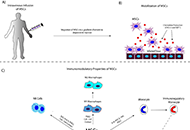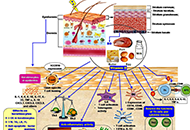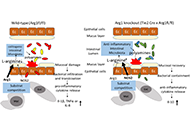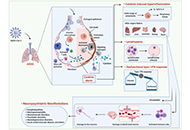Interplay between mesenchymal stromal cells and immune system: clinical applications in immune-related diseases
Mesenchymal stromal cells (MSCs) are a mesodermal stem cell population, with known self-renewal and multilineage differentiation properties. In the last century, MSCs have been widely used in regene
[...] Read more.
Mesenchymal stromal cells (MSCs) are a mesodermal stem cell population, with known self-renewal and multilineage differentiation properties. In the last century, MSCs have been widely used in regenerative medicine and tissue engineering approaches. MSCs initially were isolated from bone marrow aspirates, but currently have been identified in a great number of tissues of the human body. Besides their utilization in regenerative medicine, MSCs possess significant immunoregulatory/immunosuppressive properties, through interaction with the cells of innate and adaptive immunity. MSCs can exert their immunomodulatory properties with either cell-cell contact or via paracrine secretion of molecules, such as cytokines, growth factors and chemokines. Of particular importance, the MSCs’ immunomodulatory properties are explored as promising therapeutic strategies in immune-related disorders, such as autoimmune diseases, graft versus host disease, cancer. MSCs may also have an additional impact on coronavirus disease-19 (COVID-19), by attenuating the severe symptoms of this disorder. Nowadays, a great number of clinical trials, of MSC-mediated therapies are evaluated for their therapeutic potential. In this review, the current knowledge on cellular and molecular mechanisms involved in MSC-mediated immunomodulation were highlighted. Also, the most important aspects, regarding their potential application in immune-related diseases, will be highlighted. The broad application of MSCs has emerged their role as key immunomodulatory players, therefore their utilization in many disease situations is full of possibilities for future clinical treatment.
Panagiotis Mallis ... Catherine Stavropoulos Giokas
Mesenchymal stromal cells (MSCs) are a mesodermal stem cell population, with known self-renewal and multilineage differentiation properties. In the last century, MSCs have been widely used in regenerative medicine and tissue engineering approaches. MSCs initially were isolated from bone marrow aspirates, but currently have been identified in a great number of tissues of the human body. Besides their utilization in regenerative medicine, MSCs possess significant immunoregulatory/immunosuppressive properties, through interaction with the cells of innate and adaptive immunity. MSCs can exert their immunomodulatory properties with either cell-cell contact or via paracrine secretion of molecules, such as cytokines, growth factors and chemokines. Of particular importance, the MSCs’ immunomodulatory properties are explored as promising therapeutic strategies in immune-related disorders, such as autoimmune diseases, graft versus host disease, cancer. MSCs may also have an additional impact on coronavirus disease-19 (COVID-19), by attenuating the severe symptoms of this disorder. Nowadays, a great number of clinical trials, of MSC-mediated therapies are evaluated for their therapeutic potential. In this review, the current knowledge on cellular and molecular mechanisms involved in MSC-mediated immunomodulation were highlighted. Also, the most important aspects, regarding their potential application in immune-related diseases, will be highlighted. The broad application of MSCs has emerged their role as key immunomodulatory players, therefore their utilization in many disease situations is full of possibilities for future clinical treatment.
 Interplay between mesenchymal stromal cells and immune system: clinical applications in immune-related diseasesOpen AccessReviewMesenchymal stromal cells (MSCs) are a mesodermal stem cell population, with known self-renewal and multilineage differentiation properties. In the last century, MSCs have been widely used in regene [...] Read more.Panagiotis Mallis ... Catherine Stavropoulos GiokasPublished: June 30, 2021 Explor Immunol. 2021;1:112–139
Interplay between mesenchymal stromal cells and immune system: clinical applications in immune-related diseasesOpen AccessReviewMesenchymal stromal cells (MSCs) are a mesodermal stem cell population, with known self-renewal and multilineage differentiation properties. In the last century, MSCs have been widely used in regene [...] Read more.Panagiotis Mallis ... Catherine Stavropoulos GiokasPublished: June 30, 2021 Explor Immunol. 2021;1:112–139 Vitamin D and immunomodulation in the skin: a useful affirmative nexusOpen AccessReviewSkin is the largest organ of the body having multifunctional activities. It has a dynamic cellular network with unique immunologic properties to maintain defensive actions, photoprotection, immune r [...] Read more.Saptadip SamantaPublished: June 30, 2021 Explor Immunol. 2021;1:90–111
Vitamin D and immunomodulation in the skin: a useful affirmative nexusOpen AccessReviewSkin is the largest organ of the body having multifunctional activities. It has a dynamic cellular network with unique immunologic properties to maintain defensive actions, photoprotection, immune r [...] Read more.Saptadip SamantaPublished: June 30, 2021 Explor Immunol. 2021;1:90–111 L-arginine as a novel target for clinical intervention in inflammatory bowel diseaseOpen AccessReviewArginase-1 (Arg1) and the inducible nitric oxide synthase 2 (NOS2) compete for the common substrate L-arginine, semi-essential amino acid, and central intestinal metabolite. Both enzymes exhibit var [...] Read more.Björn Nüse, Jochen MattnerPublished: June 30, 2021 Explor Immunol. 2021;1:80–89
L-arginine as a novel target for clinical intervention in inflammatory bowel diseaseOpen AccessReviewArginase-1 (Arg1) and the inducible nitric oxide synthase 2 (NOS2) compete for the common substrate L-arginine, semi-essential amino acid, and central intestinal metabolite. Both enzymes exhibit var [...] Read more.Björn Nüse, Jochen MattnerPublished: June 30, 2021 Explor Immunol. 2021;1:80–89 Immunopathogenesis of severe acute respiratory syndrome coronavirus-2: evolving knowledge and its current statusOpen AccessReviewAs the severe acute respiratory syndrome coronavirus (SARS-CoV)-2 is a new virus, the current knowledge on the immunopathogenesis of this newly emerged SARS-CoV-2 is beginning to unravel with intens [...] Read more.Nitin Saksena ... Monica Miranda-SaksenaPublished: June 30, 2021 Explor Immunol. 2021;1:61–79
Immunopathogenesis of severe acute respiratory syndrome coronavirus-2: evolving knowledge and its current statusOpen AccessReviewAs the severe acute respiratory syndrome coronavirus (SARS-CoV)-2 is a new virus, the current knowledge on the immunopathogenesis of this newly emerged SARS-CoV-2 is beginning to unravel with intens [...] Read more.Nitin Saksena ... Monica Miranda-SaksenaPublished: June 30, 2021 Explor Immunol. 2021;1:61–79